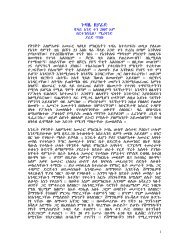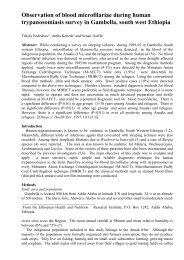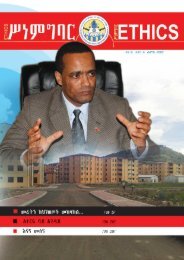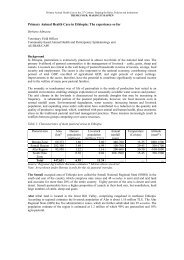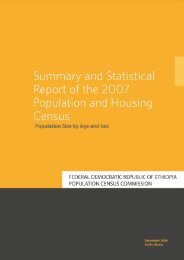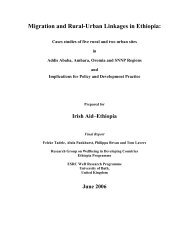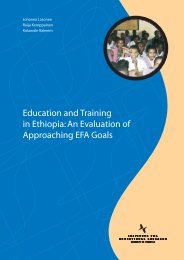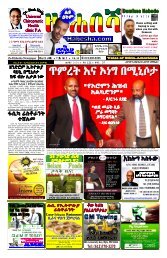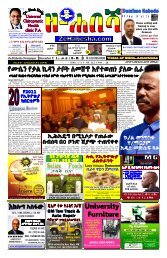means to delay an early initiation of sex in adolescents should have started early at home by thefamily and primary school teachers. However, the fact that families in rural communities are eithernot knowledgable about the subject matter or due to their nature of extendedness, they are not ableto give due consideration to the importance of educating young boys and girls on sexuality,parenthood, and other matters. Moreover, such matters are often viewed as a sign of erodedsocietal values and norms and thus are not welcomed by traditional societies (3,4,5).Policy-makers and the school community, on the other hand, seem to have understood thedifficulties only late. This situation, when coupled with the cultural taboos in poor countries thatinfluence decision-making on sensitive issues, such as adolescent sexuality, makes inclusion ofFamily Life Education (FLE) into school curricula a tough challenge. It is with such a dilemmathat we face horrifying figures on the growing rates of illness and death from clandestine abortions,STI’s, and HIV/AIDS, and their remaining social and economic consequences today.The following report is a summary of two surveys carried out on two different occasions inZway, a rural town located 160 km south-east of Addis Ababa. It was done on high schoolstudents and families who have children in the age range of 10-24 years. The purpose was toassess their awareness status and attitude on adolescent sexuality, teen-age pregnancy and itscomplication, HIV/AIDS and STI, etc (essential components of FLE). These surveys have alsoattempted to assess the attitude and behaviour regarding parent-youth communication onreproductive health matters at home environment and level of young peoples’ sexuality.MethodsTwo cross-sectional surveys were carried out in November 1996 and October 1997, on highschool students and parents (mostly family heads) who had children aged 10-24 years in Zway, arural town 160km south of Addis Ababa. A statistically representative sample size was calculatedwith a 95% significant level and a power of 80% in each case. Multi-stage stratified samplingmethod was used to obtain study subjects from a list of student rosters in the school (students) andkebele (smallest administrative unit) residents registers in the town (parents). Both students andparents were provided with self-administered a structured questionnaire that was filledanonymously. In both cases, an informed consent was initially obtained. Cultural sanctions on thesensitive nature of the issue were taken care of for parents by gender aggregation of the intervieweeand interviewers. Data were collected by senior medical students. Analysis was made using EPI-INFO version 6 statistical software.ResultsGeneral: Three hundred and forty-three students and 246 adult subjects were studied. Table 1shows some of the sociodemographic characteristics of the parents. Students were from 9 th to 12 thgrades, constituting 38.8% (9 th ), 28.6% (10 th ), 21.9% (11 th ), and 10.8%Table 1: Sociodemographic characteristics of the parents, Zway, 1996-97.Variables Frequency N= 246 Percent- Relation to the youth underconsiderationBiological (father/mother) 234 95.1Foster families 12 4.9- EducationIlliterate 59 23.9Primary education 106 43.1Secondary & above 81 32.9- OccupationHousewives 123 50Employed(private/gov’t*) 46 18.7Small scale merchants 41 16.7Others 36 14.6- Current marital status
Married 184 74.8Widowed/divorced/ separated 62 14.6Age range was 30-69 Yrs.; (69.5% in the age range of 30 to 49 years)* governmentTable 2: Knowledge and attitude of the students pertaining to important variables on reproductivehealth, by sex, Zway, 1996-1997.Variables MalesFemalesOR(95% CI)(N= 218)(N= 125)- It’s normal & acceptable to 178 (81.6%) 69 (55.2%) 3.6(2.15have sexual feeling duringadolescence- Duration of normal menstrual 122 (55.9%) 108 (86.4%) 5.0(2.72flow correctly known- Correctly knew the unsafe period 25 (11.3%) 18 (14.2%) 1.19(0.59in the menstrual cycle(12 th ). Their age range was 14-25 years (mean age = 17 years). The two groups werehomogeneous in terms of their ethnic and religious backgrounds (most were Oromo and OrthodoxChristian).Students: Fifty four percent of the students felt that it’s culturally shameful to discuss aboutphysical and psychological changes during adolescence (explained to them using examples),though males were relatively free to discuss compared to the female students (OR= 0.58; 95% CI =0.36,0.93; P0.05). Being a female student negatively influenced the tendency toadmit that increased sexual feeling during adolescence is normal and acceptable (Table 3).Seventy five percent of the students preferred to discuss about body changes that occur duringadolescence with peers of the same sex, none of them wanted it to be with their parents. Regardingthe knowledge on other aspects of human reproduction, 74.9% correctly knew the age at menarcheand 67.1% knew the average duration of menstrual flow, with dominance of female students(Table, 3). Senior class students were not better knowledgeable compared to the junior ones (Chisquarefor trend = 0.2; P >0.05).Of the total, only 13.2% knew the unsafe period during the normal menstrual cycle, and evenfemales were not better off in this aspect (Table 3). Grades did not have any effect indiscriminating knowledge on safe period of menstrual cycle either (Chi-square for trend = 2.8;P>0.05).Hundred and eight of the 343 students (31.5%) reported to have had sexual contact before thedate of the survey and males were significantly higher in number (OR= 8.3; 95% CI = 4.1,17.3;P


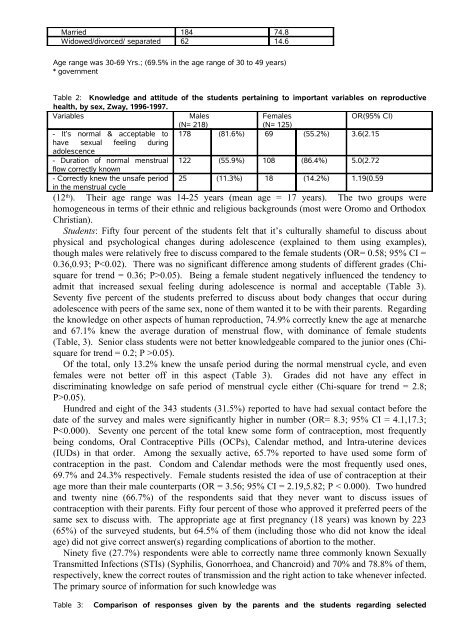

![to read the full report [pdf, Amharic] - Ethiopian Review](https://img.yumpu.com/52737829/1/190x245/to-read-the-full-report-pdf-amharic-ethiopian-review.jpg?quality=85)
